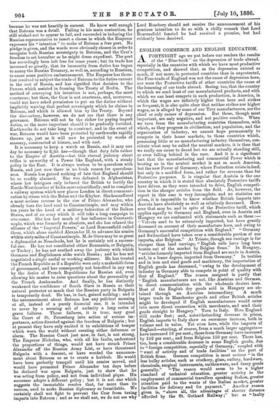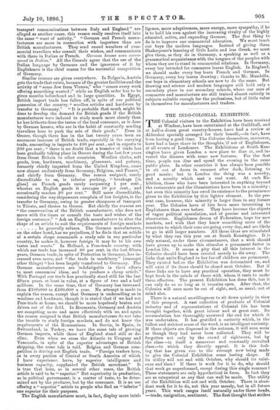ENGLISH COMMERCE AND ENGLISH EDUCATION.
AFORTNIGHT ago we put before our readers the results of the " Blue-book " on the depression of trade abroad, especially in the countries with which we have most productive competition, and showed that, as the depression existed as much, if not more, in protected countries than in unprotected, the Free-trade of England was not the cause of depression here, nor were the Protective tariffs of other countries the cause of the lessening of our trade abroad. Seeing, too, that the country to which we send least of our manufactured products, and with which we can least compete in such production, is America, in which the wages are infinitely higher than here and strikes as frequent, it is also quite clear that neither strikes nor higher wages, as is alleged by some of our Tory manufacturers, are the chief or only causes of depression. But these, though most important, are only negative, and not positive results. When we turn from the manufacturing countries themselves, with whicb, as they progress in civilisation, and population, and the organisation of industry, we cannot hope permanently to compete in their home markets, to those countries which, possessing little or no manufacturing industry themselves, con- stitute what may be called the neutral markets, it is then that we really see cause to dread lest we are actually standing still, or even falling behind in the race. And it is a significant fact that the manufacturing and commercial Power which is beating us in the neutral market is not so much America, but the new Power of Germany, where Protection exists indeed, but only in a modified form, and rather for revenue than for Protective purposes. It is singular that Austria is the one country in which it is stated that absolutely Protective tariffs have driven, as they were intended to drive, English competi- tion in the cheaper articles from the field. As, however, the report in this case is very incomplete, and no statistics are given, it is impossible to know whether British imports into Austria have absolutely as well as relatively decreased. How- ever that may be, and in spite of the Protective tariff, which applies equally to Germany and England, even in Austria and Hungary we are confronted with statements such as these :-- "Velvets used to be extensively imported, but have greatly decreased on account of their manufacture here, and owing to Germany's successful competition with England." "Germany and Switzerland have taken over a considerable portion of our imports, also Belgium." At Trieste, though sea carriage is far cheaper than land carriage, "English rails have long been beaten out of the market by Belgian firms." In Hungary, "articles formerly imported from England are made in Austria, and, in a lesser degree, imported from Germany." In textiles and in iron and steel goods and machinery, the importation of English goods has decreased, "owing to the development of industry in Germany able to compete in point of quality with that of England." The reason assigned is partly that 'English manufacturers are not, like Austrian and German, in direct communication with the wholesale dealers here. Most of the Englieh dry goods sold in Hungary are oh. tamed through an Austrian intermediary. A much larger trade in Manchester goods and other British articles might be developed if English manufacturers would enter into more direct connection with merchants, and send their goods straight to Hungary." Turn to Italy. Here England still ranks first ; and, notwithstanding decrease in prices, English imports to Italy show an enormous increase, both in volume and in value. Yet even here, while the imports of England—starting, of course, from a much larger aggregate— have increased 16 per cent., those from Germany have increased by 102 per cent., and from Belgium 150 per cent. There has, too, been a considerable decrease in some English goods, due to "foreign competition, especially of Germany," coupled with "want of activity and of trade facilities" on the part of British firms. German competition is most serious " in the less balky articles, such as crockery, glass, cutlery, hardware, chemica]s, surgical instruments, earthenware, and fancy goods generally." "The reason would seem to be a higher standard of technical education, greater activity in the employment of commercial travellers speaking Italian, greater attention paid to the wants of the Italian market, greater facilities for delivery and for payment." Anothsr reason given is, "above all, the advantages of shorter distance afforded by the St. Gothard Railway ;" but as "faulty transport communications between Italy and England" are alleged as another cause, this reason really resolves itself into the same " want of activity." "German and French manu- facturers are more in connection with importers than are British manufacturers. They send round numbers of com- mercial travellers who consult their wishes, and communicate with them in Italian or French. German houses even corre- spond in Italian." All the Consuls agree that the use of the Italian language by Germans and the ignorance of it by Englishmen is the chief reason for the successful competition of Germany.
Similar reasons are given everywhere. In Bulgaria, Austria gets the trade that exists, because of the greater facilities and the activity of "some Jew from Vienna," who "comes every week offering something wanted ;" while an English order has to be given months beforehand and in large quantities. In Egypt, British import trade has fallen off, in spite of our political possession of the country," woollen articles and hardware by transfer to Germany." "It is probable that much might be done to develop the demand for British goods if the British manufacturer were induced to study much more closely than he has hitherto done the tastes of the local consumer, as is done by German houses, who are in the habit of constantly sending travellers here to push the sale of their goods." Even in Greece, though there has in the last twenty years been an enormous increase of British trade, especially in the carrying trade, amounting in imports to 400 per cent, and in exports to 200 per cent., "there is no doubt that a transfer of trade has been gradually taking place in Greece during the last few years from Great Britain to other countries. Woollen cloths, soft goods, iron, hardware, machinery, glassware, and pottery, formerly chiefly imported from the United Kingdom, come now almost exclusively from Germany, Belgium, and France," and chiefly from Germany. One reason assigned, surely discreditable to us, is inferior packing, breakage [in glass] on French goods rarely surpassing 1 per cent, whereas on English goods it averages 10 per cent., and occasionally reaches 20 per cent." Still more discreditable, considering the way shipowners complain of low freights, is the transfer to Germany, owing to greater cheapness of transport to Trieste, and thence to Greece. But chiefly the reasons are "the conservatism of the British manufacturer, who does not move with the times or consult the taste and wishes of the foreign customer." "Ask an English manufacturer to alter the shape of an article to suit the requirements of foreign mat kets he generally refuses. The German manufacturer, on the other hand, has no prejudices, if he finds that an article of a certain shape commands a ready sale in any particular country, he makes it, however foreign it may be to his own tastes and wants." In Holland, a Free-trade country, with which our trade has increased 80 per cent, in the last fifteen years, German trade, in spite of Protection in Germany, has in- creased even more, and "the trade in machinery" (amongst other things) "has been largely transferred to Germany. The German manufacturers are indefatigable in their efforts to meet consumers' ideas, and to produce a cheap article." With Portugal our trade has practically stood still for the last fifteen years, at least in value, at a figure of two and a half millions. In the same time, that of Germany has increased from £100,000 to £400,000 a year. No attempt is made to explain the reason, except that Germany is underselling us in woollens and hardware, though it is stated that if we had not Free-trade at home, we should be more hopelessly beaten and driven out of the field. In Roumania, Germany and Austria are competing more and more effectively with us, and again the reason assigned is that British manufacturers do not take the trouble to study foreign markets, and do not know the requirements of the Roumanians. In Servia, in Spain, in Switzerland, in Turkey, we have the same tale of growing
German imports, while those of England stand still or de- cline. Even when we cross the Atlantic to Uruguay and Venezuela, in spite of the superior advantages of British shipping. the same tale is told. Belgian and German com- petition is driving out English trade. "Foreign traders here, as in every portion of Central or South America of which I have experience, have, by superior intelligence and business capacity, supplanted the British merchant." It is true that here, as in several other cases, the British article is said to be "superior." But superiority in production, as in political government, is a matter of taste, to be deter- mined not by the producer, but by the consumer. It is no use offering a "superior" article to people who find an "inferior" one superior for their purposes.
The English manufacturer must, in fact, display more intel-
ligence, more adaptiveness, more energy, more sympathy, if he is to hold his own against the increasing rivalry of the highly educated, active, and expanding German. The first thing to do is to improve our commercial education. We must teach our boys the modern languages. Instead of giving them Shakespeare's learning of little Latin and less Greek, we must give them, as they do in Germany, a speaking as well as a grammatical acquaintance with the tongues of the peoples with whom they are to stand in commercial relations. In Germany, every boy intended for commerce learns English. In England, we should make every boy learn French and German. In Germany, every boy learns drawing ; thanks to Mr. Mundella, our boys in elementary schools are now to do the same. But drawing and science and modern languages still hold only a secondary place in our secondary schools, where our men of commerce and manufacture are still trained almost entirely in subjects suitable enough for the professions, but of little value in themselves for manufacturers and traders.

















































 Previous page
Previous page